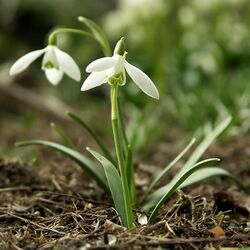Biology:Galantheae
| Galantheae | |
|---|---|

| |
| Galanthus nivalis | |
| Scientific classification | |
| Kingdom: | Plantae |
| Clade: | Tracheophytes |
| Clade: | Angiosperms |
| Clade: | Monocots |
| Order: | Asparagales |
| Family: | Amaryllidaceae |
| Subfamily: | Amaryllidoideae |
| Tribe: | Galantheae Parlatore |
| Type genus | |
| Galanthus | |
| Genera | |
| Synonyms | |
|
Galanthinae | |
Galantheae is a tribe of European, West Asian and North African flowering plants belonging to the subfamily Amaryllidoideae of the Amaryllis family (Amaryllidaceae). (As of 2017), it contains three genera, although more were included previously. The position of the ovary is inferior.
Taxonomy
For a history of the circumscription of Galantheae, see Meerow et al. 2006.[1] A narrower sense of the tribe is now favoured, with only three genera.[2]
Phylogeny
The placement of Galantheae within subfamily Amaryllidoideae is shown in the following cladogram:
| Cladogram: Tribes of subfamily Amaryllidoideae | |||||||||||||||||||||||||||||||||||||||||||||||||||||||||||||||||||||||||||||||||||||||
|
Subdivision
Previously included were:[4][5][6]
Distribution and habitat
Galantheae represent one of the three European tribes of Amaryllidaceae (predominantly Mediterranean).
Cultivation
Some species of Acis, Galanthus and Leucojum are common ornamental garden plants.
References
- ↑ Meerow et al 2006a.
- ↑ 2.0 2.1 Larsen et al 2010.
- ↑ "USDA, ARS, National Genetic Resources Program. Germplasm Resources Information Network - (GRIN). National Germplasm Resources Laboratory, Beltsville, Maryland.". http://www.ars-grin.gov/cgi-bin/npgs/html/family.pl?2570.
- ↑ Traub, H.P. (1963). Genera of the Amaryllidaceae. La Jolla, California: American Plant Life Society. http://babel.hathitrust.org/cgi/pt?id=mdp.39015006929270;view=1up;seq=3.
- ↑ Lledó, Ma D.; Davis, A. P.; Crespo, M. B.; Chase, M. W.; Fay, M. F. (14 June 2004). "Phylogenetic analysis of Leucojum and Galanthus (Amaryllidaceae) based on plastid matK and nuclear ribosomal spacer (ITS) DNA sequences and morphology". Plant Systematics and Evolution 246 (3–4). doi:10.1007/s00606-004-0152-0. https://www.researchgate.net/publication/226774240.
- ↑ Meerow, Alan W.; Snijman, Deirdre A. (1998), "Amaryllidaceae", in Kubitzki, Klaus, The Families and Genera of Vascular Plants, III, Springer-Verlag Berlin Heidelberg GmbH, pp. 83–110, doi:10.1007/978-3-662-03533-7, ISBN 978-3-642-08377-8
Bibliography
- Larsen, Maja Mellergaard; Adsersen, Anne; Davis, Aaron P.; Lledó, M. Dolores; Jäger, Anna K.; Rønsted, Nina (October 2010). "Using a phylogenetic approach to selection of target plants in drug discovery of acetylcholinesterase inhibiting alkaloids in Amaryllidaceae tribe Galantheae". Biochemical Systematics and Ecology 38 (5): 1026–1034. doi:10.1016/j.bse.2010.10.005.
- Lledó, Ma D.; Davis, A. P.; Crespo, M. B.; Chase, M. W.; Fay, M. F. (14 June 2004). "Phylogenetic analysis of Leucojum and Galanthus (Amaryllidaceae) based on plastid matK and nuclear ribosomal spacer (ITS) DNA sequences and morphology". Plant Systematics and Evolution 246 (3–4). doi:10.1007/s00606-004-0152-0. https://www.researchgate.net/publication/226774240.
- Meerow A. 1995. Towards a phylogeny of the Amaryllidaceae. In P. J. Rudall, P. J. Cribb, D. F. Cutler, and C. J. Humphries [eds.], Monocotyledons: systematics and evolution, 169-179. Royal Botanic Gardens, Kew.
- Meerow A. and D. A. Snijman. 1998 Amaryllidaceae. In K. Kubitzki [ed.], Families and genera of vascular plants, vol. 3, 83-110. Springer-Verlag, Berlin.
- Müller-Doblies, D., and U. Müller-Doblies. 1978. Studies on tribal systematics of Amaryllidaceae. 1 The systematic position of Lapiedra Lag.. Lagascalia 8: 13-23.
- Meerow, Alan W. Michael F. Fay, Charles L Guy, Qin-BaoLi, Faridah Q Zaman and Mark W. Chase. 1999 Systematics of Amaryllidaceae based on cladistic analysis of plastid sequence data. American Journal of Botany. 86: 1325.
- Meerow, AW; Francisco-Ortega, J; Schnell, RJ (2006). "Phylogenetic relationships and biogeography within the Eurasian clade of Amaryllidaceae based on plastid ndhF and nrDNA ITS sequences: lineage sorting in a reticulate area?". Systematic Botany 31 (1): 42–60. doi:10.1600/036364406775971787. https://naldc-legacy.nal.usda.gov/naldc/download.xhtml?id=1438&content=PDF. Full text
- Meerow, Alan W.; Snijman, Deirdre A. (2006). "The never-ending story: multigene approaches to the phylogeny of Amaryllidaceae". Aliso 22: 355–366. doi:10.5642/aliso.20062201.29. http://naldc-legacy.nal.usda.gov/naldc/download.xhtml?id=2425&content=PDF. Retrieved 25 January 2015.
- Müller-Doblies, U.; Müller-Doblies, D. (1996). "Tribes and subtribes and some species combinations in Amaryllidaceae J St Hil R Dahlgren & al. 1985". Feddes Repertorium 107 (5–6): S.c.1–S.c.9.
- Vigneron, Pascal. "Amaryllidaceae" (in French). http://www.amaryllidaceae.org//index.htm.
- Stevens, P.F. (2001–2012), Angiosperm Phylogeny Website: Amaryllidoideae, http://www.mobot.org/mobot/research/apweb/orders/asparagalesweb.htm#Amaryllidaceae
- "Amaryllidaceae: A taxonomic tool for the Amaryllidaceae of the world". eMonocot. http://amaryllidaceae.e-monocot.org/.
External links
| Wikimedia Commons has media related to Galantheae. |
Wikidata ☰ Q10501970 entry
 |

